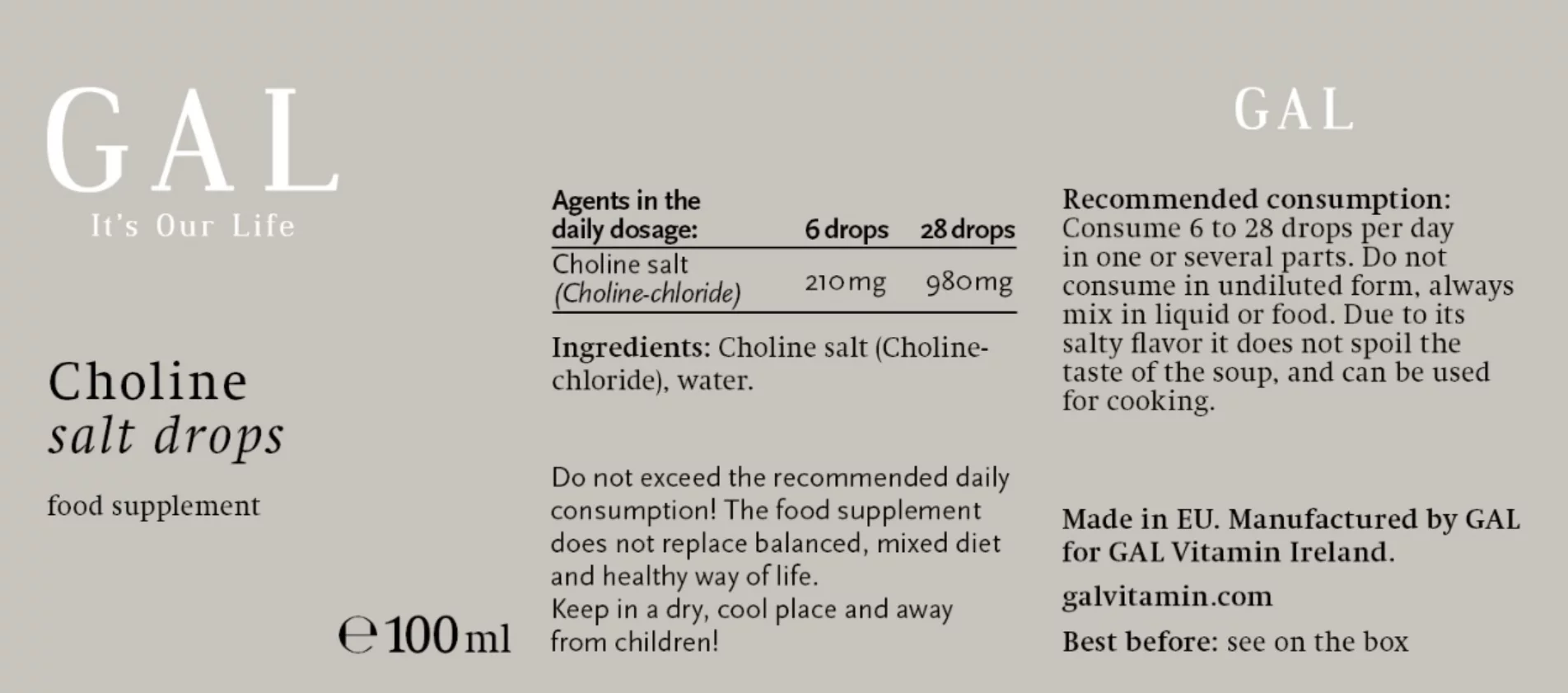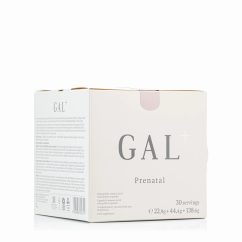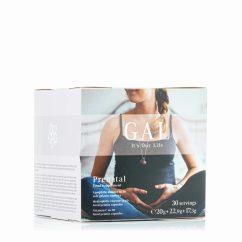
Choline salt
Consumption of an adequate quantity of choline is important to make sure that our brain, nervous system, liver and kidneys operate sufficiently, as a matter of fact, it is important for the smooth operation of all of our cells. Direct consequences of low choline intake are among others metabolic syndrome, bad memory, neural tube closure abnormality, poorly functioning nervous system (increased sensitivity to stress), insulin resistance and fatty liver, and liver cirrhosis. Unfortunately, most people suffer from severe choline deficiency, and only very few people ingest choline in sufficient quantity.
The only natural food containing large quantities of choline are egg yolk, liver, and the brain. Many consume eggs and liver. One egg yolk contains 120-150mg of choline, whereas 100g liver contains approximately 400mg. Strong heat treatments are harmful to choline, but cooking/braising is not.
Everyone should ingest 5-600mg of choline every day (the official recommendation is between 425-550mg). Who eats a daily average of 4-5 egg yolks? Or just 3-4 per day, but in this case also liver at least twice a week? I hope, many people. However, who does not, should supplement it!
Mothers and choline salt
Choline is even more important for pregnant women, and they need it in much larger quantities. They should ingest at least 930mg of choline per day, which is equal to 6 to 8 egg yolks.
In addition to the fact that it is of key importance for the normal development of the fetus, and so it can help prevent abnormal development of the fetus; during research conducted in 2012 it was found that mothers ingesting 930mg choline during pregnancy gave birth to healthier children with “better” nervous system, than those, who received only 480mg choline. “Better” nervous system means that the stress level of both the placenta and of the fetus decreased during the pregnancy (CRH, cortisol), and several months after they were born they possessed a better “stress system” (e.g. better functioning HPA axis, better feedback). When such infants with better “stress system” reach adulthood, they will be better protected against numerous illnesses, including insulin resistance, hypertension and all stress-related diseases, as the susceptibility to stress is greatly determined by the quality of the HPA axis established upon birth (it is known that premature babies will become adults much more susceptible to stress and insulin resistance).
It is also an interesting observation on behalf of Weston Price, that also primitive, natural people provide nutrition richer in choline to mothers during pregnancy and breastfeeding.
So, by ensuring that pregnant women ingest at least 930mg of choline at least during the third trimester, you make the first and probably the most important step to becoming more balanced adults. In addition, it presumable prevents preeclampsia during pregnancy, as the reason for that is the high CRH (corticotropin-releasing hormone) level of the placenta, which can be reduced by taking choline. This research is also interesting because mothers and their children taking 930mg of choline per day showed significant positive changes in comparison with a group of mothers also ingesting a relatively high quantity: 480mg per day. During the research project choline chloride, i.e. choline salt was used (in both groups 380mg choline came from nutrition, whereas in one group +100mg choline came from choline chloride and +550mg in the other).
One of the relevant quality indicators of choline salts (and all other ingredients with choline content, such as choline bitartrate, etc.) is the so-called main content, which is considered to be normal up to 10 ppm. Amin content of the ingredients we use is typically one-tenth of this value (1 ppm), and we used just the choline salt formula used in the research.
Neural tube closure
In addition to all this, choline is also efficient against problems related to neural tube closure. Much more important, than vitamin B9 (folic acid/folate). Moreover, in case of choline deficiency even folic acid/folate would not prevent neural tube closure, whereas only an adequate quantity of choline is capable of preventing it, even in case of low B9 / folic acid/folate intake!
Memory
Higher choline intake during pregnancy results in better memory for the children, but in addition, the rate of quick deterioration of memory of the elderly was found to be in (reverse) proportion with the quantity of choline received during fetal life and ingested after birth. Until the age of four, high choline intake is especially important to ensure sufficient development of memory. However, higher quantities of choline ingested in later stages of life - including in the elderly - have a beneficial impact on memory.
Chronic inflammation
According to analyses, higher choline intake results in lower body-wide inflammation.
Cancer
Sufficient choline intake reduces the risk of cancer, especially the risk of liver and breast cancer.
Fatty liver and metabolic syndrome
ln case of low choline intake liver becomes fat, and metabolic syndrome and insulin resistance are developed in the relatively short term.
Made in the EU
Warnings
KEEP OUT OF REACH OF CHILDREN. DO NOT EXCEED RECOMMENDED DOSE.
If you are undergoing treatment for a medical condition or if you are pregnant or lactating, please consult your medical practitioner before introducing supplementary foods to your normal routine. The dietary supplement should not be used as a substitute for a varied and balanced diet or a healthy lifestyle. Store tightly closed in a cool and dry place.

-Allergen-free
- Glutenfree
- Egg-free
- Soy allergen-free
- Dairy and lactose-free
- Free of sulfur dioxide
- Sugar-free
- GMO-free
- Vegetarian
- Vegan
- FSC paper material (CO31340)
- Packaging from carbon-neutral production
- 100% recyclable packaging
Green: The product has the described property
Red: The product does not have the described property

The numerous benefits of Choline
Choline was declared an essential micronutrient as late as 1998, so its health impact is still being researched to this very day. (1) Even in this relatively short timespan, it has become clear that a deficiency can lead to numerous problems, which concern millions of people.
Choline: An Important nutrient during pregnancy
Adequate nutrition is always worth paying attention to but never quite as significantly as during pregnancy and breastfeeding. If an important nutrient is insufficient at these critical times, it can affect not only the parent but the development and subsequent life of the unborn child. Choline is one of the micronutrients without which our bodies cannot function properly.
Brief and precise summary of Choline





